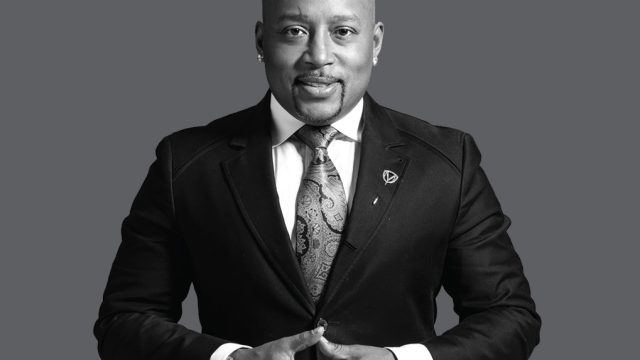The One Thing “Shark Tank’s” Daymond John Wishes He Learned Earlier

Daymond John’s journey from the streets of Queens, New York, to multimillionaire global fashion mogul, bestselling author, and TV star—you’ll recognize him as the energetic, headstrong, and dapper co-host of ABC’s hit reality show Shark Tank—was anything but a sure thing. In fact, if his life and career were the subject of an MBA course, it would probably be titled “Never Give Up 101.”
Most recently, the TV star revealed in an interview with Good Morning America that he’s survived a brush with cancer. “I had an extensive physical and they discovered there was a nodule on thyroid,” John told GMA’s Robin Roberts about his second-stage cancer (meaning it was still contained to the gland and hadn’t yet spread to his lymph nodes). But while the rest of us might freak out upon receiving such a diagnosis, John says he “didn’t skip a beat.”
“I had that removed,” he went on. “I didn’t miss anything, I was out partying and dancing two days later—not that I should of.”
Suffice it to say, John has a long history in defying expectations and playing by his own rules. As a 20 year-old in the 1990s, the aspiring designer took $40 worth of fabric—which he personally fashioned into a collection of wool hats—and turned it into $800 in sales overnight. That early windfall planted the seeds for a fashion career in which he simply refused to accept failure. He worked at as a waiter, maxed-out credit cards, even mortgaged his mother’s house. A few years—a few lucky breaks—later, and John was founder and president of FUBU, sitting atop a fashion empire with more than $6 billion in sales. Today he’s not only as busy as ever, but he’s also as hungry as he’s ever been to expand his holdings, challenge himself, and continue to evolve.
We caught up with “the Godfather of Urban Fashion” earlier this year to discuss his unique motivational concept of “healthy paranoia,” why entrepreneurship is humanity’s “great equalizer,” and the one thing he wishes he knew as a young man. And for more great career advice, here’s how to thrive as a first-time boss.
How do you define success?
I don’t believe there is one overall vision of how success looks. Earning my first couple of million, buying the big home and having a family are marks of success, but so is realizing that I didn’t just waste 15 years of work. So, there are levels of success, and you have to have a healthy paranoia to keep moving in order to reach the next one.
You mentioned that success needs to involve “a healthy paranoia.” What’s an example of that?
When things weren’t going well [in my business] I tried other businesses. Losing self-doubt is a mark of success. I’ve come to realize that know that I can do something similar and even greater…that I have a career in this.
What do you find rewarding about work?
Being able to employ 50 people from my neighborhood. Knowing that I’ve helped people, provided an opportunity for them to build lives, buy homes, raise kids who are good people. That’s extremely gratifying.
You didn’t really have that kind of opportunity when starting out. What is it that you wish you had or knew when were younger?
I wish I had financial intelligence. I wish I knew how to work with the tool of money. When I look back to where my path was disrupted, it was mainly due to not having financial intelligence.
And you know 90 percent of us don’t have that. “What is compounding interest?” “What is depreciation?” We should be educating our children in financial intelligence at the earliest ages. Studies show that we would not have as much student loan debt and overleveraged loans.
And you’d have more successful Shark Tank contestants!
Entrepreneurship is empowering. It is the number one equalizer. It takes racism and prejudice out of the equation. It helps people to stand on their own. It can change governments. It can change what’s happening in homes. It’s reduces domestic violence.
You’re obviously passionate about that. And you’ve were appointed an Ambassador of Global Entrepreneurship by President Obama. What would you like your legacy to be?
First, I want my children to be proud of the things their dad has done. I think I can change people’s lives by employing more people and helping them to achieve their own dreams, and educating. That’s really something we do on Shark Tank. You know Mark Cuban, he doesn’t need to do the show. But when he found out that the show is number one with parents and kids watching together, that was important. When a kid wants to become a shark, when he understands the value of work and respects what mom and dad do day in and day out, that’s the show’s real reward.
For more amazing advice for living smarter, looking better, and feeling younger, follow us on Facebook now!